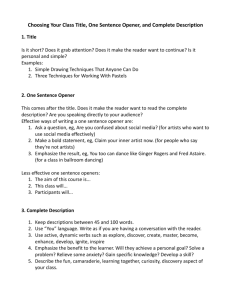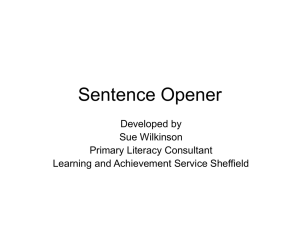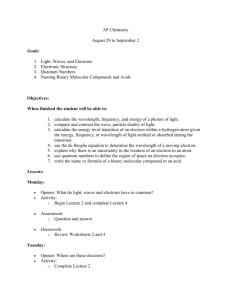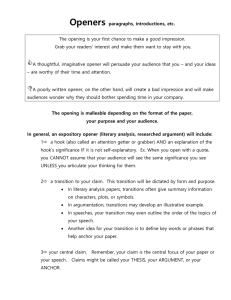(Grade/ Subject Matter) Lesson Plan
advertisement
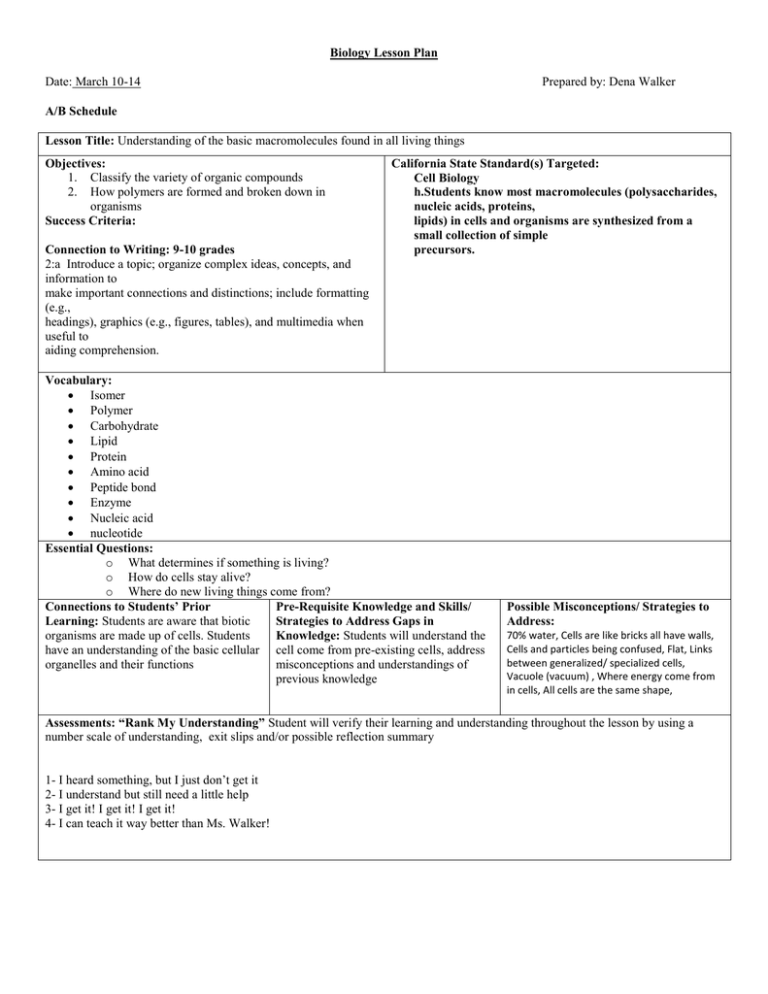
Biology Lesson Plan Date: March 10-14 Prepared by: Dena Walker A/B Schedule Lesson Title: Understanding of the basic macromolecules found in all living things Objectives: 1. Classify the variety of organic compounds 2. How polymers are formed and broken down in organisms Success Criteria: Connection to Writing: 9-10 grades 2:a Introduce a topic; organize complex ideas, concepts, and information to make important connections and distinctions; include formatting (e.g., headings), graphics (e.g., figures, tables), and multimedia when useful to aiding comprehension. California State Standard(s) Targeted: Cell Biology h.Students know most macromolecules (polysaccharides, nucleic acids, proteins, lipids) in cells and organisms are synthesized from a small collection of simple precursors. Vocabulary: Isomer Polymer Carbohydrate Lipid Protein Amino acid Peptide bond Enzyme Nucleic acid nucleotide Essential Questions: o What determines if something is living? o How do cells stay alive? o Where do new living things come from? Connections to Students’ Prior Pre-Requisite Knowledge and Skills/ Learning: Students are aware that biotic Strategies to Address Gaps in organisms are made up of cells. Students Knowledge: Students will understand the have an understanding of the basic cellular cell come from pre-existing cells, address organelles and their functions misconceptions and understandings of previous knowledge Possible Misconceptions/ Strategies to Address: 70% water, Cells are like bricks all have walls, Cells and particles being confused, Flat, Links between generalized/ specialized cells, Vacuole (vacuum) , Where energy come from in cells, All cells are the same shape, Assessments: “Rank My Understanding” Student will verify their learning and understanding throughout the lesson by using a number scale of understanding, exit slips and/or possible reflection summary 1- I heard something, but I just don’t get it 2- I understand but still need a little help 3- I get it! I get it! I get it! 4- I can teach it way better than Ms. Walker! Activity Name (Include Time Allocation) March 10/11 5-10 minutes, Opening activities Learning Opportunities Description Lesson Resources/ Materials Daily Science opener, attendance 15-20 minutes Ppt Lecture Teacher will lecture macromolecules of life 30 minutes-Vocabulary word Vocabulary quiz March 14/17 Background and relevance to life Students will look up the vocabulary words listed below Students will compare the structures and functions of four types of organic compounds called biochemical Book, paper, colored pensils, scissiors, computer paper 20 minutes, Life Substances pg 157 Foldable (notes) March 12/13 5-10 minutes, Opening activities on Powerpoint, discussion, handouts (science opener) the Daily Science opener, attendance Students will have guided notes on macromolecules lecuture Powerpoint, discussion, handouts (science opener) 40-50 minutes, Life Substances pg 157 Foldable (notes)-due today Students will compare the structures and functions of four types of organic compounds called biochemical Book, paper, colored pensils, scissiors, computer paper 20 minutes The Chemistry of Life Students will use the worksheet to enforce their skills and understanding about CHNOP Worksheet and book March 14/17 5-10 minutes, Opening activities Daily Science opener, attendance Vocabulary Quiz (20 minutes) Students will text on unit vocabulary words Introduction to Cellular Diffusion-video Cellular Diffusion (45 minutes) Students will conduct a web quest on cellular diffusion Homework: Powerpoint, discussion, handouts (science opener) handout Netbooks and handouts Additional Notes: Students are responsible for making up any material that they miss while out. If students did not complete any of the day’s work, students will need to complete for homework. Vocabulary quiz March 14/17 Accommodations/ Modifications: How will the lesson be differentiated to meet the needs of advanced learners, struggling learners, and English Learners? ELL/ SEL Ppt with colored pictures of cell SPED/ Struggling Learner Extended time Gifted/ Advanced Peer-tutoring organelles Access to book Assign peer tutoring Highlight key words Extended time Provide extra examples as needed Bilingual dictionary/resources Use positive reinforcement Repeat directions Oral prompts and clues Allow oral responses as summative Ppt with colored pictures of cell organelles Access to book Assign peer tutoring Shorten assignments/tasks Use positive reinforcement Repeat directions Oral prompts and clues Allow student to move forward with next day enrichment activity
